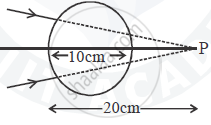Advertisements
Advertisements
Question
A point object is placed at a distance of 30 cm from a convex mirror of focal length 30 cm. The image will form at
Options
infinity
pole
focus
15 cm behind the mirror.
Solution
15 cm behind the mirror
Since u = − 30 cm
v = ?
f = 30 cm
From the mirror formula
\[\frac{1}{u} + \frac{1}{v} = \frac{1}{f}\]
\[or\frac{1}{v} = \frac{1}{f} - \frac{1}{u}\]
\[ \Rightarrow \frac{1}{v} = \frac{1}{30} - \frac{1}{- 30}\]
\[\frac{1}{v} = \frac{1}{30} + \frac{1}{30}\]
\[\frac{1}{v} = \frac{2}{30}\]
\[ \therefore v = 15 \text{ cm }\]
APPEARS IN
RELATED QUESTIONS
A fish which is at a depth of l2 em .in water `(mu = 4/3)` is viewed by an observer on the bank of a lake. Its apparent depth as observed: by the observer is:
a) 3 cm
b) 9 cm
c) 12 cm
d) 16 cm
Determine the value of the angle of incidence for a ray of light travelling from a medium of refractive index \[\mu_1 = \sqrt{2}\] into the medium of refractive index \[\mu_2 = 1\] so that it just grazes along the surface of separation.
Is the formula "Real depth/Apparent depth = μ" valid if viewed from a position quite away from the normal?
The refractive index of a material changes by 0.014 as the colour of the light changes from red to violet. A rectangular slab of height 2.00 cm made of this material is placed on a newspaper. When viewed normally in yellow light, the letters appear 1.32 cm below the top surface of the slab. Calculate the dispersive power of the material.
Consider the situation in figure. The bottom of the pot is a reflecting plane mirror, S is a small fish and T is a human eye. Refractive index of water is μ. (a) At what distance(s) from itself will the fish see the image(s) of the eye? (b) At what distance(s) from itself will the eye see the image(s) of the fish.

A converging beam of light travelling in air converges at a point P as shown in the figure. When a glass sphere of refractive index 1 . 5 is introduced in between the path of the beam, calculate the new position of the image. Also draw the ray diagram for the image formed.

A ray of light travelling in a transparent medium of refractive index n falls, on a surface separating the medium from air at an angle of incidents of 45°. The ray can undergo total internal reflection for the following n.
What is angle of deviation due to refraction?
Obtain the equation for critical angle.
Explain the reason for glittering of diamond.
What is mirage?
How does an endoscope work?
Obtain the equation for lateral displacement of light passing through a glass slab.
A ray of light travels from air to water to glass and aga in from glass to air. Refractive index of water with respect to air is 'x' glass with respect to water is 'y' and air with respect to glass is 'z'. which one of the following is correct?
An object is immersed in a fluid of refractive index 'µ'. In order that the object becomes invisible when observed from outside, it should ______.
When a light ray is incident on a prism at an angle of 45°, the minimum deviation is obtained. If refractive index of material of prism is `sqrt2`, then angle of prism will be ______.
`sin pi/4=1/sqrt2, sin30^circ=cos60^circ=1/2`
When a ray of light is incident normally on one refracting surface of an equilateral prism of refractive index 1.5, the emerging ray ______.
`[sin^-1(1/1.5)=41.8^circ]`
